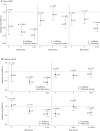Integration of risk factors for Parkinson disease in 2 large longitudinal cohorts
- PMID: 29643081
- PMCID: PMC5952970
- DOI: 10.1212/WNL.0000000000005473
Integration of risk factors for Parkinson disease in 2 large longitudinal cohorts
Abstract
Objective: To prospectively examine how selected lifestyle factors and family history of Parkinson disease (PD) combine to determine overall PD risk.
Methods: We derived risk scores among 69,968 women in the Nurses' Health Study (NHS) (1984-2012) and 45,830 men in the Health Professionals Follow-up Study (HPFS) (1986-2012). Risk scores were computed for each individual based on the following factors previously associated with PD risk: total caffeine intake, smoking, physical activity, and family history of PD for the NHS, and additionally total flavonoid intake and dietary urate index for the HPFS. Hazard ratios were estimated using Cox proportional hazards models. In addition, we performed tests of interactions on both the multiplicative and additive scale between pairs of risk factors.
Results: We documented 1,117 incident PD cases during follow-up. The adjusted hazard ratios comparing individuals in the highest category of the reduced risk score to those in the lowest category were 0.33 (95% confidence interval: 0.21, 0.49; ptrend < 0.0001) in the NHS and 0.18 (95% confidence interval: 0.10, 0.32; ptrend < 0.0001) in the HPFS. Results were similar when applying the risk scores computed by summing the predictors weighted by the log of their individual effect sizes on PD risk in these cohorts. Additive interaction was present between no family history of PD and caffeine in men and between caffeine and physical activity in women.
Conclusions: Our results suggest that known protective factors for PD tend to have additive or superadditive effects, so that PD risk is very low in individuals with multiple protective risk factors.
© 2018 American Academy of Neurology.
Figures


References
-
- Valente EM, Salvi S, Ialongo T, et al. PINK1 mutations are associated with sporadic early-onset parkinsonism. Ann Neurol 2004;56:336–341. - PubMed
-
- Abbas N, Lücking CB, Ricard S, et al. A wide variety of mutations in the parkin gene are responsible for autosomal recessive parkinsonism in Europe. Hum Mol Genet 1999;8:567–574. - PubMed
-
- Zimprich A, Biskup S, Leitner P, et al. Mutations in LRRK2 cause autosomal-dominant parkinsonism with pleomorphic pathology. Neuron 2004;44:601–607. - PubMed
-
- Polymeropoulos MH, Lavedan C, Leroy E, et al. Mutation in the α-synuclein gene identified in families with Parkinson’s disease. Science 1997;276:2045–2047. - PubMed
Publication types
MeSH terms
Grants and funding
LinkOut - more resources
Full Text Sources
Other Literature Sources
Medical
